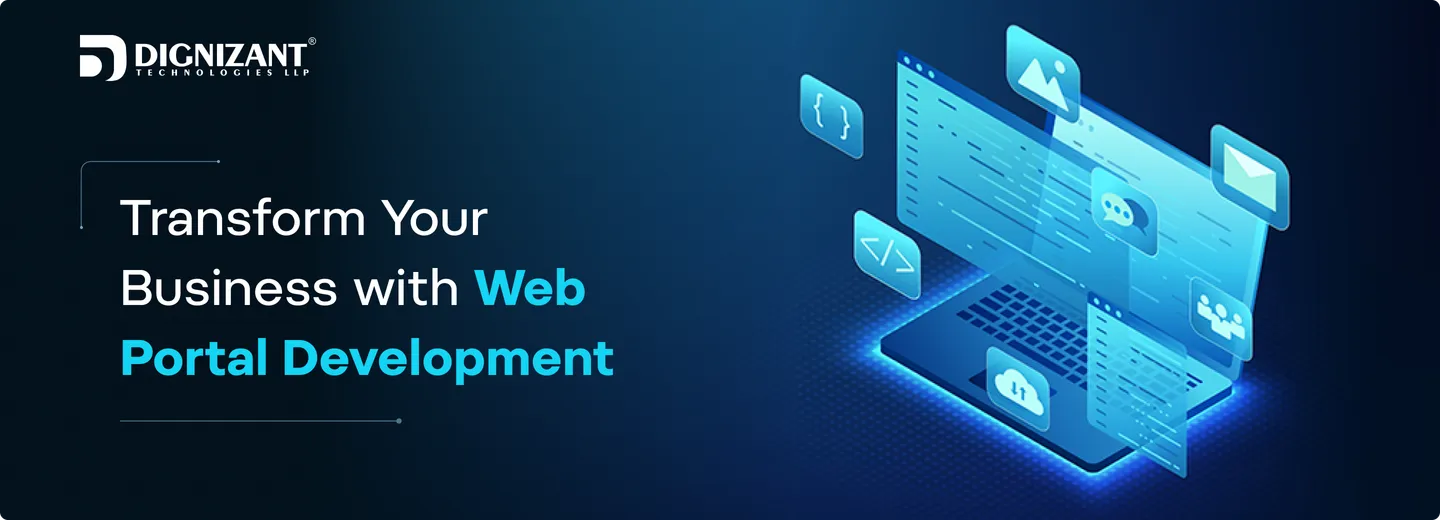Transform Your Business with Web Portal Development

Contributor
Arjun Solanki
Uploaded
16 October, 2025
Read Time
6 Minutes
Now more than ever, a company’s online presence is not just a marketing tool but a channel to growth, efficiency, and customer engagement in a digital first world. Companies that used to have traditional websites are now developing web portals to build interactive, data rich and user centric solutions.
Portals, unlike static websites, are dynamic environments where customers, employees and partners can engage in real time. From eCommerce sites to enterprise dashboards, web portals are transforming the way businesses run, connect and grow.
What Is Web Portal Development?
Web portal development is the process of creating secure, centralized web based applications, which can be customized by users to retrieve particular information, tools or services. These portals, quite boldly, integrate all these different elements such as communication with data management and processing into one single user interface.
As a case in point, a customer portal can be used to pay invoices, place orders, and track order status an employee portal for managing HR functions, team collaboration and resource sharing.
In the end, it’s all for a better user experience, more efficient business, and greater brand interaction delivered in a clean and easy to use design with powerful features.
Why Businesses Need Web Portals
The move to digital has led to customer and employee expectations of easy, on their own access to services. An effective web portal can:
- Enhance communication: Bring teams, partners, and customers together in one place.
- Improve efficiency: Centralize information and automate repetitive work.
- Increase transparency: Allow users to have immediate access to pertinent information.
- Strengthen customer loyalty: Deliver personalized, value driven experiences.
Companies who invest in web portal development emerge stronger and ahead of the competition, and more importantly, they create better, long term relationships with their end users.
Key Types of Web Portals
1. Customer Portals
Customer portals enable users to update their profiles, check transactions and receive support. Convenience and transparency lead to happier customers.
2. Employee Portals
Employee portals consolidate company information like payroll, leave application, internal communication etc. so that the process becomes more streamlined and well organized.
3. Partner and Vendor Portals
These portals enhance B2B connections by allowing immediate access to documents, invoices, and performance reports.
4. E-commerce Portals
With e-commerce portals, you get product catalog, payment, customer insight all in one powerful platform to help you create a complete digital shopping experience.
Each portal has its own dedicated application, but all are designed under the same premise to simplify engagement and increase productivity.
Core Benefits of Web Portal Development
Improved User Engagement
Consumers want everything at their own convenience. These people such access is provided via an easy to use portal that allows users to avail of the services at any time from anywhere. This boosts engagement and drives repeat usage.
Streamlined Operations
Web portals also save time by automating the workflows and by integrating various systems eliminating human errors. Staff can innovate rather than perform mundane tasks.
Data Driven Decision Making
Portals collect and centralize data that can be analyzed to understand trends, performance, and user behavior. Integrating Web Analytics Consulting into your portal strategy ensures decisions are based on insights, not assumptions.
Enhanced Security
Portals gather and centralize data that can be analyzed to identify trends, performance and user behavior. Add Web Analytics Consulting into your portal strategy to keep your decisions informed by insights not assumptions.
Scalability and Customization
Whether you are a small business or a large corporation, the portal can grow with you. Developers have the ability to customize the experience for different workflows and branding.
Web Development and Portal Integration
Web development in fact, underpins the entire portal. Developers utilize frameworks, programming languages, and content management systems (CMS) to create these websites.
The addition of sophisticated instruments like APIs, and dashboards of data visualization, turns portals into intelligent systems providing, in the moment reporting and analytics. The integration of web development and portal functionality enables greater usability and performance.
Features That Define an Effective Web Portal
- Personalized Dashboards – Display relevant content based on user profiles.
- Secure Login and Role Management – Protect data and assign appropriate access levels.
- Search and Navigation Tools – Help users quickly find the information they need.
- Data Integration – Connect different systems like CRM, ERP, and analytics platforms.
- Mobile Responsiveness – Ensure smooth accessibility across devices.
- Collaboration Tools – Enable messaging, file sharing, and task management.
A well designed portal isn’t just functional, it's intuitive, adaptable, and visually appealing.
The Role of Analytics in Web Portals
In the age of digitalization, data is a strategic resource. With the help of analytics, companies are able to track how users interact with their products, what features are the most popular, and what areas of the product that need improvement.
Working with specialist Web Analytics Consulting providers enables businesses to better quantify success. Traffic engagement and conversion patterns can be unveiled through analytics dashboards that will allow teams to optimize both user experience and business objectives.
How Web Portal Development Drives Business Growth
1. Better Customer Retention
Your customers who get value out of working through your portal are also more likely to be loyal customers of your brand. Customized content and self service capabilities help them stay involved.
2. Higher Productivity
Instead of bogging down their time with redundant tasks, employees can focus on thinking and dreaming.
3. Competitive Advantage
Advanced portals enabled businesses to differentiate themselves with enhanced user experiences and business intelligence agility.
4. Cost Efficiency
Automation reduces reliance on manual processes, leading to lower operation costs and higher profitability.
Challenges in Web Portal Implementation
While portals offer immense benefits, businesses must address common challenges during development:
- Integration complexity: Connecting legacy systems with state of the art applications.
- User adoption: Getting employees and customers to adopt new platforms.
- Security and compliance: Complying with data protection and privacy laws.
- Continuous optimization: Modifying texts, images, and functions to maintain the relevancy of portals.
Partnering with professional programmers almost assures these issues are handled well, and the success of the product is long term.
Best Practices for Successful Web Portal Development
- Define Clear Goals: Know what you want to achieve and who your target users are before you start designing.
- Prioritize UX Design: Simple, intuitive design promotes engagement and user satisfaction.
- Incorporate Feedback: Keep collecting feedback from users to improve.
- Ensure Mobile Optimization: Develop your portals to be mobile friendly, capable of being used on mobile phones and tablets.
- Test and Monitor: Monitor the portal performance on a regular basis to ensure it is performing at optimal speeds and is always reliable.
These best practices contribute to delivering a portal that meets the expectations of the business as well as the users.
Future of Web Portals in the Digital Era
The evolution of web portal development is heading towards intelligent and integrated portal solutions. AI, automation and predictive analytics will also have a significant impact on personalization of user experience and assist in decision making.
The use of new technologies such as voice search, real time chat and data visualization will allow portals to become more interactive and user friendly. Companies that embrace these new technologies now will gain a long term advantage in the digital market.
Conclusion
The evolution of web portal development has revolutionized the way an organisation deals with its customers. A good portal is not just an online interface, but a core business tool that generates engagement, productivity and growth.
Taking advantage of the capabilities of modern web development, intelligent design, and actionable insights from Web Analytics Consulting, organizations can develop portals that revolutionize their operations and provide genuine value to their users.
Transformation in the digital age begins with innovation and innovation starts with a powerful web portal.
Latest Articles

Explore how Flutter powers scalable, high performance cross platform apps with expressive UI, reduced costs, and faster time to market.

React vs Vue Comparison guide covering React JS vs Vue JS features, performance, learning curve, and use cases to choose the right framework in 2026.

Understand how modern web development drives scalable growth by improving speed, flexibility, security, and long-term digital performance.
FAQs
Ready to Take Your Business to the Next Level?
Unlock new opportunities with expert solutions designed to elevate your brand. From strategy to execution, we empower your business with the tools, technology and talent it needs to thrive in today’s digital world.




